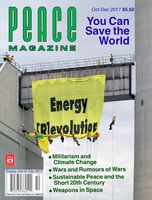
Peace Magazine Oct-Dec 2017, page 4. Some rights reserved.
Search for other articles by Metta Spencer here
“An ounce of prevention is worth a pound of cure” is an maxim worth remembering when it comes to preventing conflicts. In this issue, several writers urge preventive actions. Ernie Regehr reminds us that wars start with grievances, and that it pays to address those grievances early to prevent the violence that will otherwise follow.
Regrettably, that wise policy is followed almost nowhere. It would require strategic foresight and the thoughtful early weighing of options. Delay exacerbates each impending catastrophe and raises the costs that must eventually be paid.
Several articles herein nudge peace workers to become more pro-active, to use diplomacy earlier, to foresee crises and to act quickly to forestall them.
One illustration of this problem is the blissful ignorance that some people cultivate about the causes and effects of global warming. Lee-Anne Broadhead notes that many politicians and military planners either deny that climate change is real or deny that military activities are one of its main causes. Moreover, those who admit its reality may insist upon continuing to solve it with the very military tools that are actually exacerbating it.
Recognizing “root causes” is an element of foresight. Ernie Regehr recommends acting to prevent the marginalization of people whose grievances would lead to violence.
Laura Grego is practicing strategic foresight when she warns us about the probable consequences of using space as a battlefield. A treaty prohibits stationing weapons in space, but it is not stopping the development of new lethal gadgetry. Indeed, ballistic missile defences are also risky—not that they can really defend any country from missile attacks, but they can be used to destroy an enemy’s satellites.
In his new book, reviewed by Subir Guin, Doug Roche sees the multiple global risks of today as inter-related and their prevention as requiring a comprehensive approach.
Readers can engage in strategic foresight by participating in a forum that Science for Peace is planning. The objective is to recognize that many types of existential threats are causally linked, and, as Roche suggests, should be addressed as s single system. The forum will produce a list of about 25 policies—a checklist of solutions. You can already join the discussion on Facebook and suggest improvements on that checklist—the prototype platform shown on page 8.

Peace Magazine Oct-Dec 2017, page 4. Some rights reserved.
Search for other articles by Metta Spencer here